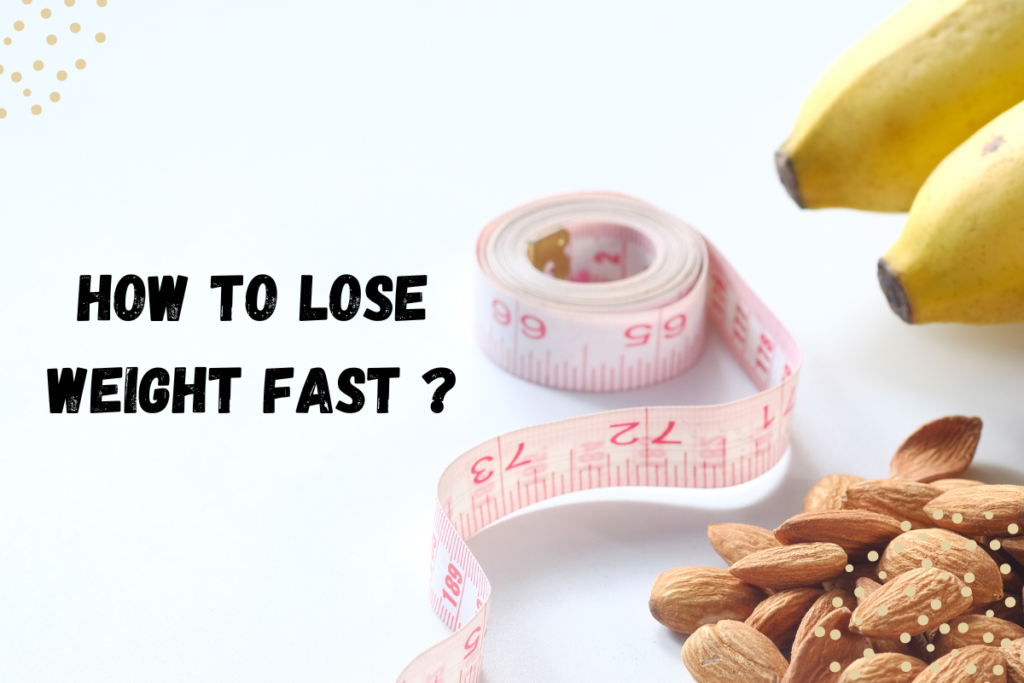Weight loss is a topic that dominates headlines, social media, and conversations. It seems that everybody’s looking for the “holy grail” diet to lose weight rapidly. Yet with so many sources of information today, it is very common to suffer from being overwhelmed or misinformed. The truth is, losing weight fast isn’t just about fad diets or extreme workouts—it’s about understanding your body, making sustainable changes, and staying consistent. In this blog, I’ll share proven strategies , backed by science and personal experience, to help you HOW TO LOSE WEIGHT FAST effectively. Let’s dive in.

Understanding the Basics of Weight Loss
Burning more calories than you consume. According to a study published in The American Journal of Clinical Nutrition, a calorie deficit of 500–1000 calories per day can lead to a weight loss of 1–2 pounds per week. This can be accomplished by dietetics and exercise. Tracking my calories on apps such as MyFitnessPal really helped me. It helped me stay accountable and understand portion sizes better. I realized that I was consuming way more calories than I thought, especially from snacks and beverages.
The Role of Nutrition
Your diet plays a crucial role in weight loss. Research from Harvard Medical School shows that a diet rich in whole foods—like fruits, vegetables, lean proteins, and whole grains—can promote weight loss and improve overall health. Personally, I found that cutting out processed foods and sugary drinks made a significant impact. I used to drink soda every day, but switching to water not only reduced my calorie intake but also improved my energy levels. Subtle shifts (e.g., substitute white bread for whole grain and/or grill chicken as opposed to frying) accumulate with time.
Exercise: Finding What Works for You
Exercise is essential for burning calories and building muscle. In Obesity a study reported that the best way to lose weight is to combine cardio and strength training. I begin with 30 min walking and then added high intensity interval training (HIIT) workout. I understood I didn’t need to spend hours at the gym for changes to become apparent. For me, dancing and yoga became my go-to workouts because they didn’t feel like a chore. The secret is selecting things that you relish (i.e., things you want to keep doing).
The Importance of Sleep and Stress Management
Sleep and stress are frequently ignored but the combined outcome can have a profound effect on weight loss. A prospective study published in the International Journal of Obesity indicated that, the problem of poor sleep can cause weight gain by affecting hunger hormone, increasing the desire of food, and decreasing energy levels. I noted that the more I focused on sleep and stress-relieving activities such as meditation, the fewer cravings for unhealthy food I experienced. I also felt more energized and focused, which made it easier to stick to my workout routine.
Staying Consistent and Patient
Weight loss is a journey, not a sprint. The case study presented in The Mayo Clinic has emphasized the role of repeatability across repeated measurements. Getting frustrated is a common thing when you do not see an immediate result, however, incremental changes over time become the key to success. I’ve been able to take setting achievable goals and celebrating small wins for example. For example, losing 1–2 pounds a week might not seem like much, but over time, it adds up. Remember, it takes time to make progress, and it is fine to experience some setbacks. What matters is getting back on track.
The Power of Support Systems
Having a support system can make a huge difference. Research in Health Psychology shows that people who have accountability partners or join weight loss groups are more likely to succeed. When I started my weight loss journey, I felt isolated and unsure if I could stick to my goals. But sharing my progress with friends and family kept me motivated and accountable. We even created a group chat and shared healthy recipes and tips on workout. Knowing I wasn’t alone made the journey feel less daunting.

Conclusion
Rapid weight loss is possible, though this has to be a balanced tactic to include nutrition, physical activity, sleep and stress. If you know the science of weight loss and commit to only the easiest, most sustainable modifications, you will get to your goals without being overwhelmed. Remember, everyone’s journey is different. What worked for me didn’t necessarily have to work for you, and that’s fine. The crucial thing is to work out what suits you and keep at it. Rejoice in your achievements, however modest they may be and do not beat yourself up too much if you experience a stumble. Weight loss is a marathon, not a sprint—patience and persistence will pay off in the long run.
FAQS
What is the most important principle in order to lose weight fast?
The most important principle is keeping a deficit; this is bringing in fewer calories than are expended. A 500-1000 calorie deficit per day leads to 1-2 pounds of weight loss each week.
Do I have to follow a special “diet” to lose weight?
You do not need to follow a special diet in order to lose weight, but one thing you want to work on is a diet full of whole-food fruits, veggies, lean proteins, and whole grains. Cutting out processed foods and sugary drinks can greatly help.
How much exercising will it take to lose weight?
The most effective exercise plan includes both cardio and strength training, so start out with what you can manage. Thirty minutes of walking is great; just slowly work your way up. Consistency counts for more than type of exercise.
Can poor sleep ruin some of my weight-loss efforts?
Of course, poor sleep messes with your hunger hormones, cravings, and energy. Sleep is actually one of the most important factors to keep on top of in weight loss.
Is it okay to have cheat days?
It’s okay to treat yourself once in a while, but moderation is the key. If you go too far, you might reverse your weight loss progress. Create a cheat day that is calculated and stick back to the program the next day.
How do I keep going during my weight loss?
Set realistic goals, celebrate small victories along the way, and find a support team. Get fellow friends or family to cheer you on and share your success, as having someone accountable to can help keep a big burn for sadness from showing on your face.
Does stress affect weight loss?
Stress can invoke emotional eating and cravings. So, practicing stress-relief techniques like meditation or yoga gives more leverage towards your goals.
Do I have to keep track of how many calories I consume?
Counting calories may help keep yourself accountable and understanding portion sizes. You may also wish to look into recruiting an app like MyFitnessPal, which makes keeping track of your food count far easier and still within your calorie limits.

